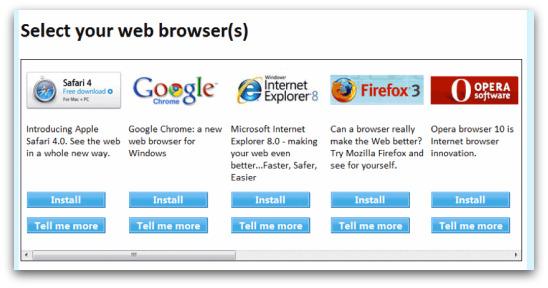 The antitrust case came to an end this December when the European Commission decided to accept Microsoft’s proposal of presenting a ballot screen to Windows users that have IE set as the default browser. In Europe, for the next 5 years, Windows users will be presented with what Microsoft calls a “choice screen”. This is basically a ballot screen that presents a total of 12 browsers, including Apple’s Safari, Google’s Chrome, Microsoft’s Internet Explorer, Mozilla’s Firefox, Opera Software’s Opera and the socially oriented Flock browser.
The antitrust case came to an end this December when the European Commission decided to accept Microsoft’s proposal of presenting a ballot screen to Windows users that have IE set as the default browser. In Europe, for the next 5 years, Windows users will be presented with what Microsoft calls a “choice screen”. This is basically a ballot screen that presents a total of 12 browsers, including Apple’s Safari, Google’s Chrome, Microsoft’s Internet Explorer, Mozilla’s Firefox, Opera Software’s Opera and the socially oriented Flock browser. According to Microsoft, the way the choice screen looks and the way it works have been developed according to the specifications of the European Commission. It presents some of the best known browsers out there, with links the user can click and learn more about a specific browser. The user can decide to stick with IE, or he can get one of the browsers included in the choice screen.
Microsoft will roll out the choice screen gradually, starting with the 1st of March. Dave Heiner, Vice President and Deputy General Counsel, explains: “We plan to begin a phased roll-out of the update across Europe the week of March 1.The browser choice screen software update will be offered as an automatic download through Windows Update for Windows XP, Windows Vista and Windows 7. The software update will be installed automatically, or will prompt you to download or install it, depending on which operating system you are running and your settings for Windows Update. If you do not have automatic updating enabled, you can get the choice screen by going to Windows Update and clicking on Check for Updates.”

People with malicious intent could use this occasion for their benefit, announced Sophos, company
that specializes in providing antivirus, anti-spam, spyware removal software, network and internet security, data protection, and computer security solutions. They may come up with phony choice screens in an effort to push malware on unsuspecting users.
"The likes of Google and Mozilla will be rubbing their hands in glee at the chance of increasing their share of the browser market, and this increased exposure should be good for them. It will be fascinating to see how many average internet users are tempted to try surfing via another program," said Graham Cluley, senior technology consultant at Sophos. "But there is a real danger that cybercriminals might attempt to take advantage of this initiative by creating bogus browser choice screens that could pop up on innocent users' PCs and potentially lead them to a malicious download."
Microsoft will roll out the choice screen gradually, starting with the 1st of March. Dave Heiner, Vice President and Deputy General Counsel, explains: “We plan to begin a phased roll-out of the update across Europe the week of March 1.The browser choice screen software update will be offered as an automatic download through Windows Update for Windows XP, Windows Vista and Windows 7. The software update will be installed automatically, or will prompt you to download or install it, depending on which operating system you are running and your settings for Windows Update. If you do not have automatic updating enabled, you can get the choice screen by going to Windows Update and clicking on Check for Updates.”

People with malicious intent could use this occasion for their benefit, announced Sophos, company
that specializes in providing antivirus, anti-spam, spyware removal software, network and internet security, data protection, and computer security solutions. They may come up with phony choice screens in an effort to push malware on unsuspecting users.
"The likes of Google and Mozilla will be rubbing their hands in glee at the chance of increasing their share of the browser market, and this increased exposure should be good for them. It will be fascinating to see how many average internet users are tempted to try surfing via another program," said Graham Cluley, senior technology consultant at Sophos. "But there is a real danger that cybercriminals might attempt to take advantage of this initiative by creating bogus browser choice screens that could pop up on innocent users' PCs and potentially lead them to a malicious download."




Your Comments
0 Responses to "Microsoft to Roll Out Browser Ballot Screen"